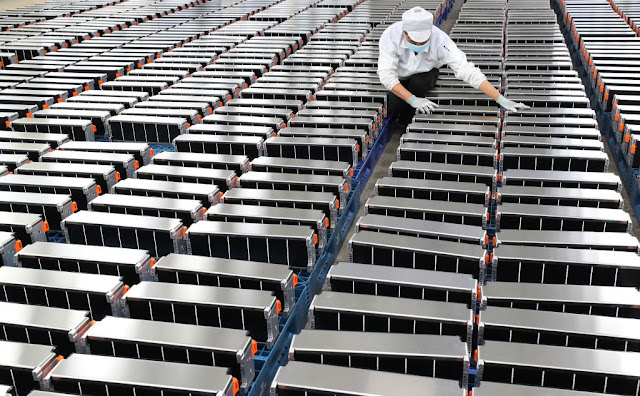A worker checks parts for battery packs at a factory belonging to Sunwoda Electric Vehicle Battery in Nanjing in east China’s Jiangsu province in March 2021. (Photo by Feature China/Future Publishing via Getty Images)
The US government announced in early May that it will provide more than $3bn to boost domestic production of electric vehicle (EV) batteries. The proposal was announced as the US car industry pivots to meet President Joe Biden’s goal for half of vehicle sales in the country to be electric by 2030.
However, electrifying the US car fleet could yet prove challenging, as experts warn of a gap between future production and demand for the critical minerals needed for EV batteries. Electric car sales are booming, but scaling up mining in the short term is difficult: on average, it takes 16.5 years to take a new mine from planning to production.
Additionally, most minerals needed for EVs are produced in a handful of countries, making the supply chain vulnerable to price volatility and disruptions.
That is why the Biden administration also announced a separate $60m programme for battery recycling in early May 2022. By reusing materials from end-of-life batteries, a secondary domestic supply chain independent of the mining supply chain could be created.
According to US-based analysts Allied Market Research, the global EV battery recycling market was valued at around $139m in 2017 and is expected to grow to $2.27bn by 2025.
The need for independence and security of supply has become more urgent since Russia invaded Ukraine – the first halts to gas deliveries to Poland and Bulgaria, and most recently Finland, have had countries scrambling for alternatives. A month before announcing the $3bn EV battery boost, Biden already invoked the Defense Production Act to increase the mining of EV battery minerals.
This gives the government more access to funding to support mining, processing and recycling of critical minerals. According to the US Geological Survey, the country had a net import reliance of 100% for graphite and manganese in 2021, followed by 75% for cobalt, almost 50% for nickel and more than 25% for lithium. Energy Monitor - link - Isabeau van Halm - link - more like this (USA) - link - users, dealers and miners - link
Additionally, most minerals needed for EVs are produced in a handful of countries, making the supply chain vulnerable to price volatility and disruptions.
That is why the Biden administration also announced a separate $60m programme for battery recycling in early May 2022. By reusing materials from end-of-life batteries, a secondary domestic supply chain independent of the mining supply chain could be created.
According to US-based analysts Allied Market Research, the global EV battery recycling market was valued at around $139m in 2017 and is expected to grow to $2.27bn by 2025.
The need for independence and security of supply has become more urgent since Russia invaded Ukraine – the first halts to gas deliveries to Poland and Bulgaria, and most recently Finland, have had countries scrambling for alternatives. A month before announcing the $3bn EV battery boost, Biden already invoked the Defense Production Act to increase the mining of EV battery minerals.
This gives the government more access to funding to support mining, processing and recycling of critical minerals. According to the US Geological Survey, the country had a net import reliance of 100% for graphite and manganese in 2021, followed by 75% for cobalt, almost 50% for nickel and more than 25% for lithium. Energy Monitor - link - Isabeau van Halm - link - more like this (USA) - link - users, dealers and miners - link

No comments:
Post a Comment